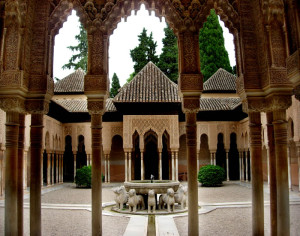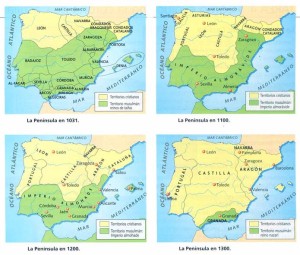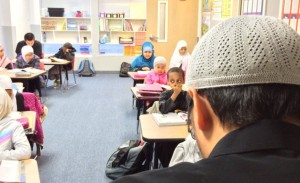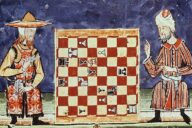Second installment of the “Islamophobia in Spain. 2015 National Report” written by the Islamic Culture Foundation, in which we analyze the treating of Islam and the Islamic civilization in the Spanish education system, its reflection in our understanding of the country’s history and the teaching of this religion to Muslim students.
Education plays a very important role when trying both to normalize an aspect which might seem alien for part of the population and to prevent the radicalization of Muslims, one of the current main concerns of any European government. Nonetheless, Spain fails to appropriately cover the educational realm both for Muslims and non-Muslims, with regards to the teaching of Islam for Muslim students and to the contents covered at both primary schools and high schools when speaking about said religion.
A hidden curriculum
 First of all, we need to refer to what has been called the “hidden curriculum”, understood in this context as the contents which are obviated, ignored or unknown in the school curriculum (Mayoral Arqué et al., 2009: 253). It is very significant the existence of said hidden curriculum with regard to Islam and the Muslim civilization in the Spanish education, especially when taking into account the importance it has had in the Spanish history during the eight centuries of existence of al‑Andalus. Several authors have informed of the existence of a created antagonism between the Judeo‑Christian civilization and the Islamic civilization and of the denial of the Arabic contribution to the Spanish national identity (Martín Muñoz, 1998), as well as of the existence of an orientalist approach to Islam and Muslims, in which exotic and ancient images dominate over the actual imaginary, thus giving more importance to Islamic art and folklore than to Islamic thought, science or literature (Mayoral Arqué et al., 2009). It is also representative the almost inexistent references to the presence of Muslims in the current countries’ society (Mayoral Arqué et al., 2009). This creates a spiral of lack of knowledge and misinformation that reflects in all stages of the Spanish education, as it also proves the lack of lines of research with Islamic references at the current universities, in fields, such as, for instance, medical science, which doesn’t correspond to the Spanish Islamic tradition on this field.
First of all, we need to refer to what has been called the “hidden curriculum”, understood in this context as the contents which are obviated, ignored or unknown in the school curriculum (Mayoral Arqué et al., 2009: 253). It is very significant the existence of said hidden curriculum with regard to Islam and the Muslim civilization in the Spanish education, especially when taking into account the importance it has had in the Spanish history during the eight centuries of existence of al‑Andalus. Several authors have informed of the existence of a created antagonism between the Judeo‑Christian civilization and the Islamic civilization and of the denial of the Arabic contribution to the Spanish national identity (Martín Muñoz, 1998), as well as of the existence of an orientalist approach to Islam and Muslims, in which exotic and ancient images dominate over the actual imaginary, thus giving more importance to Islamic art and folklore than to Islamic thought, science or literature (Mayoral Arqué et al., 2009). It is also representative the almost inexistent references to the presence of Muslims in the current countries’ society (Mayoral Arqué et al., 2009). This creates a spiral of lack of knowledge and misinformation that reflects in all stages of the Spanish education, as it also proves the lack of lines of research with Islamic references at the current universities, in fields, such as, for instance, medical science, which doesn’t correspond to the Spanish Islamic tradition on this field.
Studying Islam in Spain
 On the other hands, with regard to Muslim students, the relation with the Islamic religion was first regulated by the Cooperation Agreements of 1992, which recognized several rights for Muslims, such as the possibility of having a halal menu or of receiving Islamic religion lessons when, at least, 10 students demand it. However, this has resulted in a very slow legal development, mainly due to the transference of education competences to the Autonomous Communities and to some of the autonomous governments’ lack of interest, and to the initial lack of competence of the Islamic Commission of Spain, which could not name the teachers who were to teach this subject. Although these gaps are gradually being filled in, recent reports (Islamophobia Special Report 2014, UCIDE) prove that although it has been recognized at an institutional level, it has not been put into practice in most of Spain.
On the other hands, with regard to Muslim students, the relation with the Islamic religion was first regulated by the Cooperation Agreements of 1992, which recognized several rights for Muslims, such as the possibility of having a halal menu or of receiving Islamic religion lessons when, at least, 10 students demand it. However, this has resulted in a very slow legal development, mainly due to the transference of education competences to the Autonomous Communities and to some of the autonomous governments’ lack of interest, and to the initial lack of competence of the Islamic Commission of Spain, which could not name the teachers who were to teach this subject. Although these gaps are gradually being filled in, recent reports (Islamophobia Special Report 2014, UCIDE) prove that although it has been recognized at an institutional level, it has not been put into practice in most of Spain.
A demographic study developed by the same institution declared that a 90 % of the Spanish Muslim population does not have access to religion lessons.
This is due to several reasons, among them the lack of interest showed by the scholar institutions, which many times fail to even advise Muslim families that they have such option, and the lack of means, especially of employed teachers. This contrasts with the number of professionals specialized in this subject, as, according to the Union of Islamic Communities in Spain (UCIDE), only one every ten specialized teachers is actually employed at a school (Demographic Study of Muslim Population, UCIDE). In addition to this, we need to add the lack of initiatives in the secondary education, as the Education Agreement only covers Islamic education at primary schools.
Currently, Spain has 47 employed teachers of Islamic religion, a small number for the almost 2 million Muslims that live in Spain today. Furthermore, this religious option is only offered in 6 out of the 19 autonomous territories Spain has: Andalucía, País Vasco, Canarias, Aragón and the autonomous cities of Ceuta and Melilla.
Bibliography
Dolores Mayoral Arqué and Fidel Molina Luque and Lluis Samper Rasero. “¿Islamofobia o currículo nulo? La representación del Islam, las culturas musulmanas y los inmigrantes musulmanes en los libros de texto en Cataluña”. Revista de educación, Núm. 357, enero‑abril (2012): 257-279.
Gema Martín Muñoz, “Entre el tópico y el prejuicio. El islam y el mundo árabe en el sistema educativo español”, Revista de educación, Núm. 316, (1998): 151-162.
Gema Martín Muñoz, Begoña Valle Simón, and Mª Ángeles López Plaza, El Islam y el mundo árabe. Guía didáctica para profesores y formadores, (Madrid: Agencia Española de Cooperación Internacional, 1998).
Observatorio Andalusí, “Estudio demográfico de la población musulmana. Explotación estadística del censo de ciudadanos musulmanes en España referido a fecha 31/12/2014”, UCIDE (2015), accessed December 10, 2015: http://observatorio.hispanomuslim.es/estademograf.pdf.
Observatorio Andalusí, “Informe especial 2014”, UCIDE (2015), accessed December 10, 2015: http://observatorio.hispanomuslim.es/isj14.pdf.
















No Comments